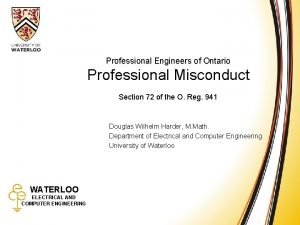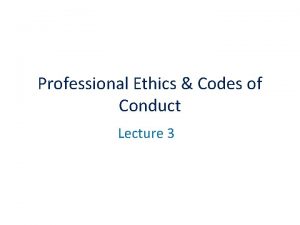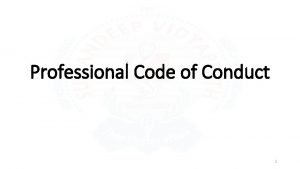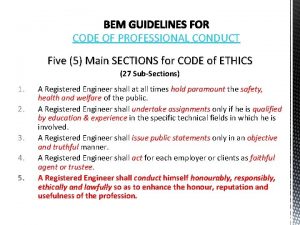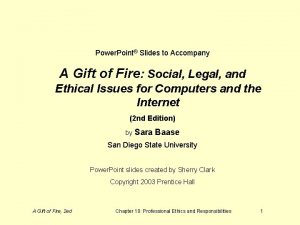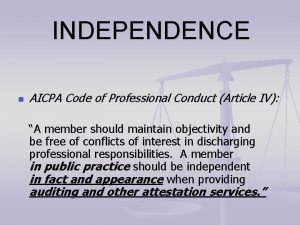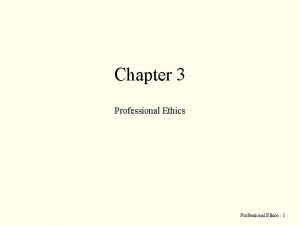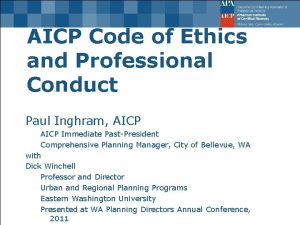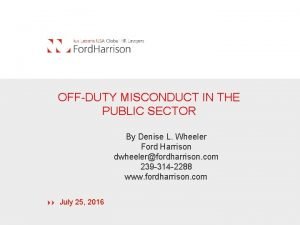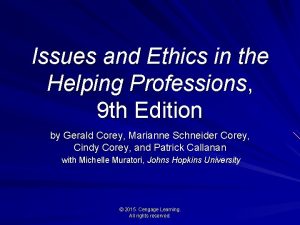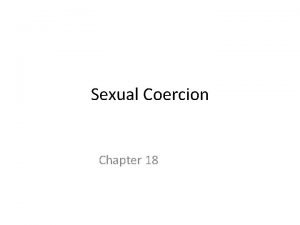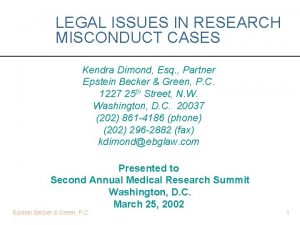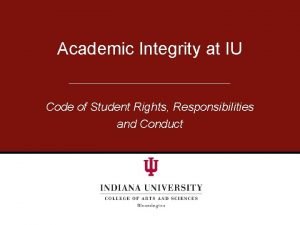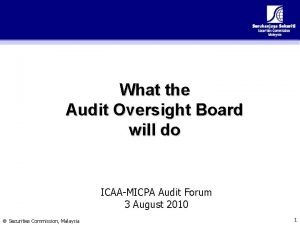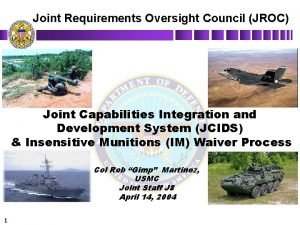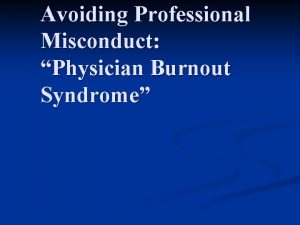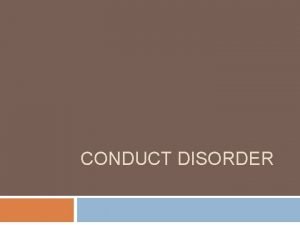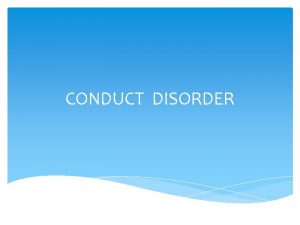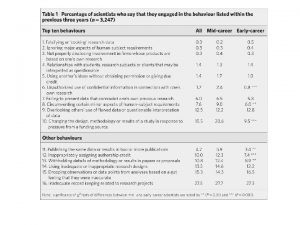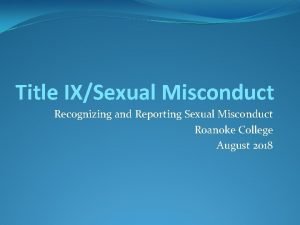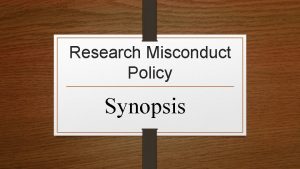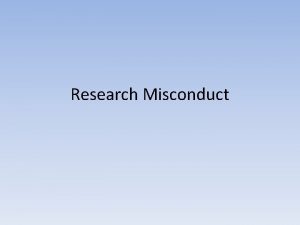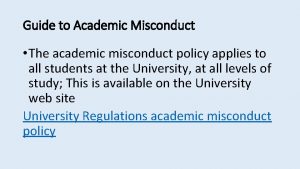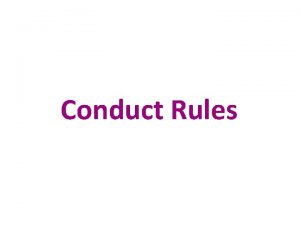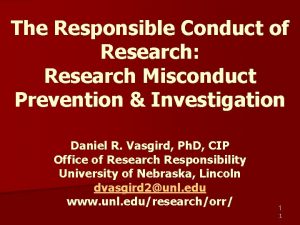Government Oversight of Physician Conduct Professional Misconduct David





![Federal Regulators HIPAA [Health Insurance Portability & Accountability Act] – Standards for Privacy of Federal Regulators HIPAA [Health Insurance Portability & Accountability Act] – Standards for Privacy of](https://slidetodoc.com/presentation_image_h2/aa6ca058f5dad46412e6923894a65c65/image-6.jpg)
![Federal Regulators National Practitioner Data Bank [NPDB] – Created in 1986 response to malpractice Federal Regulators National Practitioner Data Bank [NPDB] – Created in 1986 response to malpractice](https://slidetodoc.com/presentation_image_h2/aa6ca058f5dad46412e6923894a65c65/image-7.jpg)

![Federal Regulators Drug Enforcement Administration [DEA] Enforces USA Laws concerning Controlled Substances, Illicit Diversion, Federal Regulators Drug Enforcement Administration [DEA] Enforces USA Laws concerning Controlled Substances, Illicit Diversion,](https://slidetodoc.com/presentation_image_h2/aa6ca058f5dad46412e6923894a65c65/image-9.jpg)










- Slides: 19

Government Oversight of Physician Conduct: Professional Misconduct David Kolva, MD Andrew Knoll, MD, JD

Goals of Seminar Knowledge of Government and Non. Governmental Regulatory Agencies Understand Your Duties as a Professional Understand Laws Defining Professional Misconduct

Federal (U. S. A. ) Government Assuming Greater Role due to Mobile Society, Electronic Information Transfer, Single Payer, Drug Regulation Trend Favors Eventual National Standards Away from States and Localities

Federal Regulators (The Big Kahuna, Top of the Food Chain, etc…) Department of Health and Human Services (DHHS) Formerly Department of HEW – Huge Cabinet Level Department – ALL Federal Healthcare Financing – Multiple Agencies Will Impact Your Everyday Medical Activities!

Federal Regulators Centers for Medicare & Medicaid Services (CMMS) Formerly HCFA – Administers Financial Reimbursement for Medicare and Medicaid Patients – Creator of CPT Evaluation/Management Codes [99213 vs. 99214] – Entering Pay-for-Performance with Physician Quality Reporting Initiative [P. Q. R. I. ]
![Federal Regulators HIPAA Health Insurance Portability Accountability Act Standards for Privacy of Federal Regulators HIPAA [Health Insurance Portability & Accountability Act] – Standards for Privacy of](https://slidetodoc.com/presentation_image_h2/aa6ca058f5dad46412e6923894a65c65/image-6.jpg)
Federal Regulators HIPAA [Health Insurance Portability & Accountability Act] – Standards for Privacy of Medical Records Privacy Officer for Practices Notification of Privacy Rights to Patients – Standards for Electronic Transfers of Data – Vendor Agreements DHHS Office of Civil Rights (OCR) enforces the privacy standards, while the Centers for Medicare & Medicaid (CMS) enforces both the transaction and code set standards and the security standards (65 FR 18895).
![Federal Regulators National Practitioner Data Bank NPDB Created in 1986 response to malpractice Federal Regulators National Practitioner Data Bank [NPDB] – Created in 1986 response to malpractice](https://slidetodoc.com/presentation_image_h2/aa6ca058f5dad46412e6923894a65c65/image-7.jpg)
Federal Regulators National Practitioner Data Bank [NPDB] – Created in 1986 response to malpractice crisis (California/Nevada M. D. ’s) – Response to Create Effective Peer-Review by Shielding “Good-Faith” Efforts of Reviewers – Central Clearinghouse for M. D. sanctions and malpractice history – Credentialing Process = Mandatory Query by Hospitals or States. NOT AVAILABLE TO PUBLIC!

Federal Regulators “Stark III” (2008) Rules – Define and regulate Kick-Backs to M. D. -owned Facilities CLIA - Clinical Laboratory Improvements Act – Regulates Physician Office Laboratories as well as Commercial labs. Sets Quality Control standards – Inspections & Certifications done By States
![Federal Regulators Drug Enforcement Administration DEA Enforces USA Laws concerning Controlled Substances Illicit Diversion Federal Regulators Drug Enforcement Administration [DEA] Enforces USA Laws concerning Controlled Substances, Illicit Diversion,](https://slidetodoc.com/presentation_image_h2/aa6ca058f5dad46412e6923894a65c65/image-9.jpg)
Federal Regulators Drug Enforcement Administration [DEA] Enforces USA Laws concerning Controlled Substances, Illicit Diversion, -but– Assigning Physician Certificate to Prescribe Controlled Substances done by the States

State Regulators Under Republic Form of Government, States given Historic Rights to Define and Regulate Professions States Still Grant Licenses to Practice Each State is Independent in Actions There is no “Right” to Practice Medicine – Your Agreement to Receive License Negates Certain Civil Rights: civil vs. criminal conduct

State of New York Department of Education Grants License, however. Department of Health Regulates Physician Conduct through: – – – Bureau of Controlled Substances Clinical Laboratory Evaluation Program Board of Professional Medical Conduct Group of 200 physicians and laypersons Appointed by Governor Investigate and Adjudicate Complaints of Physician Conduct

New York State Department of Health Office of Professional Medical Conduct = O. P. M. C. – Administrative Arm of the Board – Initial Investigation of Complaints – Medical Records Review – Surveillance – Prepares Evidence for Board – Enforces Judgments

OPMC Has Strong Powers vs. “Due Process” No Statute of Limitations Identity of Complainant Secret Interviews Without Verbatim, Sworn Transcript Allows Hearsay Evidence Easier Proof Standard – “Preponderance of Evidence” (51%) vs. “Beyond a Reasonable Doubt” (Criminal Case)

Best Legal Advice Must Have Good Legal Help if Possibility of Misconduct, and MUST Have Attorney if Contacted by O. P. M. C. Some Malpractice Carriers now Offer Riders to Pay for Misconduct Defense Costs Misconduct is NOT covered by Malpractice Insurance Policy

Categories of Physician Misconduct Fraud Obtaining License or Advertising False Cures Fee-Splitting Negligence (Pattern or Gross) Conviction of Crimes (even DWI or Tax) HIPAA, OSHA, CLIA violations Practice While Impaired (Physical, Psych, Substances) Patient Abuse Failure to Report Impaired Colleague Sexual Misconduct “The Disruptive Physician”

Categories of Physician Misconduct Negligence or Incompetence usually Flagrant or Recurring Pattern – Based on “Usual Standard of Care” – Highly Dependent on Expert Testimony – Most Controversial Aspect Impaired or Disruptive Physician – Special Law Allows Entry into Treatment/Monitoring Programs – Absolves MD from Reporting – State Medical Societies Sponsor in EACH STATE

Categories of Physician Misconduct Patient Abuse – Verbal Harassment – Exercising Undue Influence – Failure to Release Records – Failure to Complete Necessary Forms for Patient Reimbursement or Benefits Failure to Report: – Child Abuse – Gunshot/Stab Wounds – Communicable Diseases Patient Discrimination – Race, Creed, HIV Status – Abandonment

Categories of Physician Misconduct Sexual Abuse: – New Strict Rules Between Patient-Physician Contacts – Especially if Psychiatric/Behavioral Counseling/Rx. – Chaperones During Genital Examination

Committee for Physicians Health Created in 1974 by Medical Society of New York State – “Doctors Helping Doctors” Concept – Confidential Referral by Colleagues even if Suspicion is Critical for Treatment and Rehabilitation – Tremendous Success Rates if Compliant – MD’s have Similar Psych, Alcohol, Drug Use Rates as National Average Population
 Professional misconduct engineering
Professional misconduct engineering Acm code of ethics and professional conduct
Acm code of ethics and professional conduct Code of conduct professional ethics
Code of conduct professional ethics Code of conduct bem
Code of conduct bem Cips code of ethics and professional conduct
Cips code of ethics and professional conduct Professional ethics presentation
Professional ethics presentation Conclusion of unesco
Conclusion of unesco Aicpa period of professional engagement
Aicpa period of professional engagement Ncees model rules of professional conduct
Ncees model rules of professional conduct Rules of professional conduct cpa ontario
Rules of professional conduct cpa ontario Aicp code of ethics and professional conduct
Aicp code of ethics and professional conduct Fabrication research misconduct
Fabrication research misconduct Off duty misconduct
Off duty misconduct Ignoring evidence of peer misconduct is
Ignoring evidence of peer misconduct is Sexual misconduct
Sexual misconduct Ori research misconduct
Ori research misconduct Scientific misconduct in research
Scientific misconduct in research Academic misconduct iu
Academic misconduct iu Audit oversight
Audit oversight Functional capabilities board
Functional capabilities board
